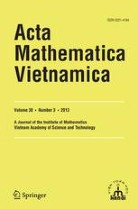
Acta Mathematica Vietnamica
- Volume 50
- Volume 49
- Volume 48
- Volume 47
- Volume 46
- Volume 45
- Volume 44
- Volume 43
- Volume 42
- Volume 41
- Volume 40
- Volume 39
- Volume 38
- Volume 37
- Volume 36
- Volume 35
- Volume 34
- Volume 33
- Volume 32
- Volume 31
- Volume 30
- Volume 29
- Volume 28
- Volume 27
- Volume 26
- Volume 25
- Volume 24
- Volume 23
- Volume 22
- Volume 21
- Volume 20
- Volume 19
- Volume 18
- Volume 17
- Volume 16
- Volume 15
- Volume 14
- Volume 13
- Volume 12
- Volume 11
- Volume 10
- Volume 9
- Volume 8
- Volume 7
- Volume 6
- Volume 5
- Volume 4
- Volume 3
- Volume 2
- Volume 1
RANDOM MATRICES: LOCALIZATION OF THE EIGENVALUES AND THE NECESSITY OF FOUR MOMENTS
TERENCE TAO, VAN VU
Abstract
Consider the eigenvalues $\lambda_i(M_n)$ (in increasing order) of a random Hermitian matrix $M_n$ whose upper-triangular entries are independent with mean zero and variance one, and are exponentially decaying. By Wigner’s semicircular law, one expects that $\lambda_i(M_n)$ concentrates around $\gamma_i\sqrt{n}$, where $\int_{-\infty}^{\gamma_i}\rho_{sc}(x)dx = \frac{i}{n}$ and $\rho_{sc}$ is the semicircular function.
In this paper, we show that if the entries have vanishing third moment, then for all $1 \leq i \leq n$ $$\mathbf{E}|\lambda_i(M_n) - \sqrt{n}\gamma_i|^2 = O(\min(n^{−c} \min(i, n + 1 - i)^{−2/3} n^{2/3}, n^{1/{3+\varepsilon}})),$$ for some absolute constant $c > 0$ and any absolute constant $\varepsilon > 0$. In particular, for the eigenvalues in the bulk ($\min\{i, n - i\} = \Theta(n))$, $$\mathbf{E}|\lambda_i(M_n) − \sqrt{n}\gamma_i|^2 = O(n^{−c}).$$ A similar result is achieved for the rate of convergence.
\indent As a corollary, we show that the four moment condition in the Four Moment Theorem is necessary, in the sense that if one allows the fourth moment to change (while keeping the first three moments fixed), then the mean of $\lambda_i(M_n)$ changes by an amount comparable to $n^{−1/2}$ on the average. We make a precise conjecture about how the expectation of the eigenvalues vary with the fourth moment.


